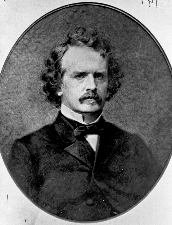Kinsley S. Bingham
Kinsley Scott Bingham (born December 16, 1808 in Camillus , Onondaga County , New York , † October 5, 1861 in Green Oak , Michigan ) was an American politician and from 1855 to 1859 the eleventh governor of the state of Michigan, which he also represented in both houses of Congress .
Early years and political advancement
Kinsley Bingham attended local schools in his New York homeland. He then studied law in Syracuse . In 1833 he moved to Green Oak, Michigan . In this place he began to work as a lawyer. At the same time he also held some public offices. For example, he was postmaster, justice of the peace, and judge at a probate court.
During those years Bingham was a member of the Democratic Party . In 1837 he was elected to the Michigan House of Representatives and was confirmed in this mandate in the following four legislative terms. At times he acted as speaker of this chamber. Between 1847 and 1851 Bingham represented his state in the US House of Representatives in Washington . During this time he came under pressure within his party because of his severe negative attitude towards slavery . Eventually he left the Democrats and temporarily joined the Free Soil Party before joining the new Republican Party .
Michigan governor
In 1854, Bingham was elected governor as his new party's candidate against former incumbent John S. Barry . Not only was he the first Republican governor of Michigan, but he was also one of the first Republican governors nationwide. He was the first of seven consecutive Michigan governors to belong to the party. It was not until 1883 that Josiah Begole , a democrat, was re-elected to this office. Bingham took office on January 3, 1855. After being re-elected in 1856, he could remain in office until January 3, 1859. During these four years the Michigan Agricultural College was founded, from which the Michigan State University would later emerge. A law protecting personal freedoms was also passed at that time. Education was also improved with the establishment of the State Reform School . In addition, other new counties and municipalities emerged in Michigan at that time.
Another résumé
Even after the end of his governorship, Bingham remained politically active. He was elected to the US Senate , where he represented his state from March 4, 1859 until his death on October 5, 1861. In terms of party politics, he remained loyal to the Republicans. As early as 1856 he was a delegate at the party's first federal convention , at which John C. Frémont was nominated as an unsuccessful presidential candidate. Four years later, Bingham supported Abraham Lincoln's successful election campaign . Kinsley Bingham was married with two children.
Web links
- Kinsley Bingham in the National Governors Association (English)
- Kinsley S. Bingham in the Biographical Directory of the United States Congress (English)
- Kinsley S. Bingham in the database of Find a Grave (English)
| personal data | |
|---|---|
| SURNAME | Bingham, Kinsley |
| ALTERNATIVE NAMES | Bingham, Kinsley Scott |
| BRIEF DESCRIPTION | American politician |
| DATE OF BIRTH | December 16, 1808 |
| PLACE OF BIRTH | Camillus , New York |
| DATE OF DEATH | October 5, 1861 |
| Place of death | Green Oak , Michigan |



